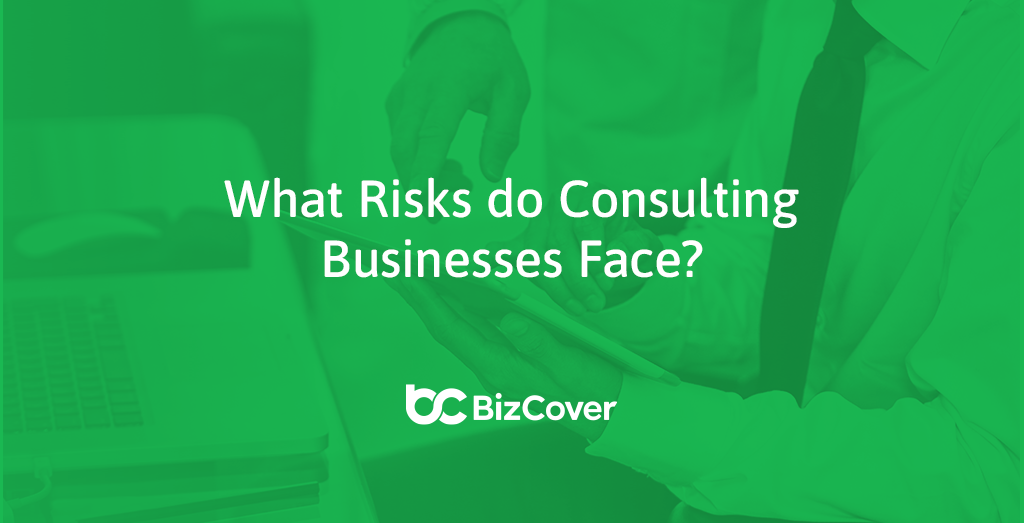5 common risks consulting firms face
Consulting is a diverse sector, operating and specialising in many facets of the Australian economy. But something that cuts through the various industries and connects consultants is some of the common risks consultants face.
Whether you are a seasoned veteran or just starting out, knowing how to mitigate these risks is essential. Read on to learn what safeguards you can put in place to protect yourself and your business.
Why do consulting businesses need a risk management plan?
A risk management plan is the strategies a consultant may use to help them avoid situations that could negatively impact their business. A plan can be essential to managing common threats, such as injuries, lawsuits, financial loss, or reputational damage.
While completely avoiding risks is ideal, it may not always be possible. This is where a risk reduction or mitigation strategy may be a viable option. You might employ strategies to reduce the likelihood of the risk occurring or reducing the impact if it does.
Five common risks to consulting businesses
1. Client expectations
Consulting clients are often demanding, expecting high quality work and faster delivery of services. However, setting realistic expectations as their consultant can help you avoid compensation claims and negligence lawsuits down the track.
Clear communication from the start can help set expectations. Clearly define what services will be delivered and provide a timeline of delivery in your business contracts. If you anticipate delays, make the client aware as soon as possible so there are no surprises. Follow up phone or in-person conversations with an email, so everything is in writing.
2. Giving bad advice
If your expert advice results in damage to your clients, you could be liable for a claim made against you.
Professional Indemnity insurance is there to cover the financial loss and legal costs in the event of a claim. The following example** shows how a Professional Indemnity policy can protect consultants from the financial consequences of a claim.
An Occupational Health and Safety (OHS) consultant ran into trouble after preparing an assessment of the common areas of a residential apartment block. A technician was severely injured whilst working on the property and a negligence claim was brought against the consultant and other defendants.
Damages against all the defendants exceeded $5 million and the consultant’s portion amounted to over $300,000. In addition to the settlement payment, $130,000 in legal costs was incurred by the Insurer.
Thankfully, the consultant had a Professional Indemnity policy, which financially protected them.
3. Cybercrime and data breaches
The risk of cybercrime is growing in Australia, with more than 94,000 cases reported in the year to June 2023 according to the Australian Cyber Security Centre (ACSC). That’s a 23% increase from the previous year.
The top Australian sectors that were targeted by cyberattacks include Federal Government (30.7%); State and Local Government (12.9%); Professional, Scientific and Technical Services (6.9%); Educational and Training (6.7%); Healthcare and Social Assistance (5.9%); Financial and Insurance Services (4.7%); and Information Media and Telecommunications (4.2%).
Given that consultants work across nearly all sectors, the risk of a cybercrime incident affecting a consulting business is high. Cyber Liability insurance is a type of business insurance which protects your business against both the legal costs and expenses related to cybercrime incidents.
4. Third party injury or property damage
Many consultants operate both in offices and on-site and interact with clients daily. These situations create the risk of a third party getting injured or having their property damaged.
All it takes is for a client to slip over in your office or for you to accidentally knock something over while doing an assessment, and you could be facing a claim. Without having a risk reduction strategy in place, your business could be financially liable.
Public Liability insurance is therefore an important insurance policy for many consultancy services.
5. Personal accident and illness
Many consultants run their own business. If you get sick or injured, it is likely that the money stops flowing and the bills won’t get paid.
Having Personal Accident & Illness insurance covers you for loss of income if you were unable to work as a result of an injury or illness. The cover is generally available regardless of whether it is caused by your work.
There is also an option to potentially cover you for accidental death or disablement, which can provide a lump sum payment to your beneficiaries.
Extra tip
While these five risks are frequently faced by consulting businesses, the financial impact of them occurring is amplified if you are a sole trader.
Unlike consulting businesses registered as a company where liability falls on the business itself, sole traders are personally responsible for all aspects of their business, both financially and legally.
In other words, sole trader consultants could have their personal assets on the line if they are forced to pay for a claim.
Given their skin in the game, it’s essential that sole traders employ a financial safeguard to personally protect them in case things go wrong.
How BizCover helps consultants
BizCover is an online service that offers a variety of business insurance options designed for the many different types of consulting businesses in Australia.
The platform has stripped away the complex forms and confusing jargon that has plagued the insurance industry and replaced it with a streamlined system that allows small business owners to compare and buy insurance in minutes.
Jump online or give BizCover a call today to get your consulting insurance sorted.
**The provision of the claims examples are for illustrative purposes only and should not be seen as an indication as to how any potential claim will be assessed or accepted. Coverage for claims on the policy will be determined by the insurer, not BizCover.
© 2024 BizCover Pty Limited, all rights reserved. ABN 68 127 707 975; AFSL 501769
This information is general only and does not take into account your objectives, financial situation or needs. It should not be relied upon as advice. As with any insurance, cover will be subject to the terms, conditions and exclusions contained in the policy wording. © 2025 BizCover Limited.





